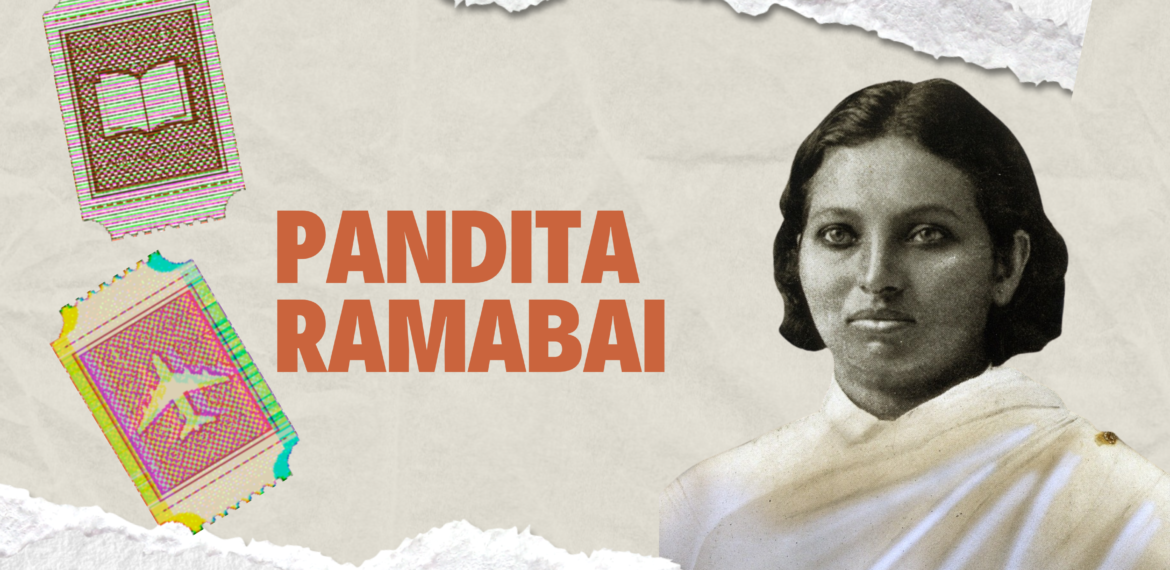Pandita Ramabai (1858-1922) was an Indian social reformer, women’s rights activist, scholar, and educator. She is best known for her pioneering work in promoting women’s education and empowerment in India, publishing books on a wide range of topics, including the status of women in India, the Bible, and Sanskrit literature. She travelled extensively in India and abroad, advocating against child marriage, widowhood, and other social injustices against women. Ramabai’s life and work continue to inspire feminists, educators, and social justice activists worldwide.
Born on April 23, 1858, in a Marathi-speaking Brahmin family as Rama Dongre, Ramabai was the daughter of Lakshmibai and Anant Shastri Dongre, a Sanskrit scholar and roving reciter of Hindu epics and religious books. Ramabai had two elder siblings: her sister Krishnabai and her brother Srinivas.
When her parents and Krishnabai died in the great famine of 1876, Ramabai, equipped with only her education, moved with Srinivas to Calcutta for a better life.
Upon reaching Calcutta, Ramabai defied societal expectations and took up the cause of distressed women as her calling. She made a name for herself in the city as a reputed scholar and passionately advocated for the emancipation of women.
At the age of twenty, she became the first woman in India to earn the titles of Pandita (the feminine of pundit, or Sanskrit scholar) and Saraswati after examination by the faculty of the University of Calcutta.
She joined the Brahmo Samaj in June 1880. The same year, after her brother’s death, she married his friend, Bepin Behari Das Medhavi, a Bengali lawyer from a lower caste- thereby creating fury amongst the society members. Her only child, Manorama, was born in April 1881. Less than a year later, her husband died of Cholera, leaving her in the unenviable situation of a high-caste Hindu widow.
After Medhavi died in 1882, Ramabai moved to Pune, where she founded the Arya Mahila Samaj, a society of high-caste Hindu women working to educate girls and against child marriage. She published her first book, Morals for Women, in the original Marathi Stri Dharma Niti. She also testified before the Hunter Commission on Education in India, an enquiry set up by the British government. She suggested that teachers be trained, women school inspectors be appointed, and that Indian women should be admitted to medical colleges. Ramabai’s evidence created a great sensation and reached Queen Victoria. In time, it also contributed to the beginnings of the Women’s Medical Movement, which aimed to improve women’s healthcare in India.
Through the influence of Nehemiah Goreh’s apologetical writings, she became intellectually convinced that whatever was true in Brahmo theology was Christian in origin. In 1883, during her visit to England, she was baptised in Wantage, England, and pursued her studies at the Cheltenham Ladies’ College and Bedford College.
She was in Europe to pursue a medical degree; however, her deafness caused serious impediments to her medical education. Instead, she used her time to continue the study of Christianity, which she had begun in India and had her young daughter baptised as Anglican Christian. From 1883 to 1886, Ramabai was, in the formal sense, an Anglo-Catholic, lecturing and studying social reform and education.
Having relinquished her dreams of a medical degree, in 1886, she travelled to the USA to attend the graduation from the Women’s Medical College in Philadelphia of Anandibai Joshee, the first Indian woman to become a medical doctor, who was also her cousin. She remained in the USA for two years, translating textbooks and giving lectures throughout the United States and Canada. In 1887 she published her first English book, The High-Caste Hindu Woman, a relentless indictment of Hindu India’s treatment of its women.
The same year, Ramabai met Frances Willard–an American educator and a woman suffragist– who later invited her to address the convention of women’s organisation. On February 1, 1889, Ramabai returned to India and, within a month, established Sharada Sadan, or the Home of Learning, in Bombay with two students.
She successfully lobbied for aid to start a secular school for child widows in India and formed The Ramabai Association, which pledged ten years of financial support for the cause.
Under the Mukti Mission, the school quickly grew and was transferred to Poona. In 1891, the school was involved in controversy when the Indian reformers condemned Ramabai for preaching Christianity to students. Despite the condemnation, by 1895, the school was a resounding success, with 26 child widows and 13 non-widows in the school.
In 1896, during a severe famine, Ramabai toured the villages of Maharashtra with a caravan of bullock carts, rescuing thousands of children, child widows, orphans and destitute women and bringing them to the shelter of Mukti and Sharada Sadan. By 1900, 1500 residents and over a hundred cattle were in the Mukti mission. The Pandita Ramabai Mukti Mission is still active today, providing housing, education, and vocational training to widows, orphans and those with sight impairments.
Her daughter Manoramabai also established a new school, and in 1919, government recognition was finally granted to the Sharada Sadan School. Pandita Ramabai was awarded the Kaiser É Hind Medal in 1919.
By 1920, Ramabai sensed a growing physical weakness and designated her daughter to supervise the activities of the Mukti Mission. Manorama died in 1921, and Ramabai herself died in 1922.
She authored several influential works in her lifetime, including The Testimony of an Indian Woman, Pandita Ramabai’s American Encounter: The Peoples of the United States (1889) and Mukti Prakash (1923) – a Marathi-language book compiled and published posthumously by her followers. Through these works, she brought the plight of women in Indian society out of the closet and made relentless efforts to realise their emancipation and empowerment.
References
Zubaan. Pandita Ramabai. Google Arts & Culture.
Eric J. Sharpe, “Ramabai, Dongre Medhavi. The History of Missiology, Boston University. Edited by Gerald H. Anderson (New York: Macmillan Reference USA, 1998), 557.
Previous musing: Government and Society in a Free and Prosperous Commonwealth



